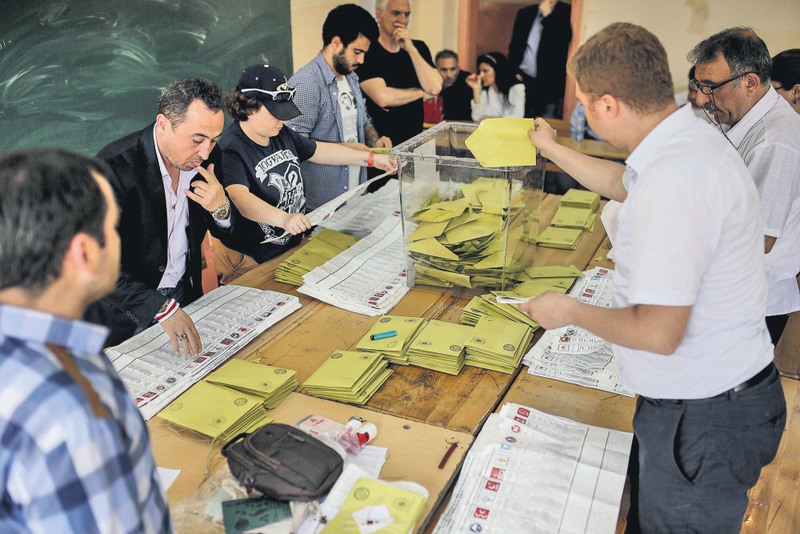President Erdoğan formally calls snap elections after meeting with parliament speaker: presidency

President Recep Tayyip Erdoğan's call for snap elections on Monday has marked the first time in Turkey's political history when such prerogative is utilized by a head of state, as the 45-day constitutional deadline to form a government has ended. The president had announced previously that the country will go to early polls on Nov. 1, after efforts by political parties to form a coalition government failed, but the president officially called for new elections on Monday evening at around 10 p.m. following his four-hour meeting with the Speaker of Parliament, İsmet Yılmaz. Sources from the president's office said he would meet Prime Minister Ahmet Davutoğlu at 11 am (0800 GMT) on Tuesday."Mr. President negotiated with Turkish Grand National Assembly Speaker İsmet Yilmaz and decided on the renewal of parliamentary elections," said the presidency statement. The decision has also been published in the official gazette, triggering the process of creating a caretaker government.According to Article 116 of the Constitution, the president can decide to go to early polls if efforts to form a government fail in the 45-day period; "In cases where the Council of Ministers fails to receive a vote of confidence under Article 110 or falls by a vote of no-confidence under Article 99 or 111, if a new Council of Ministers cannot be formed within forty-five days or fails to receive a vote of confidence, the President of the Republic, in consultation with the Speaker of the Grand National Assembly of Turkey, may decide to renew the elections."The council of ministers is now to resign and the president will appoint a prime minister to form a provisional council of ministers.The caretaker government is expected to be formed within five days after the decision is published on the Official Gazette, marking the first time Turkey will enter elections with such a cabinet. In other countries throughout the world, the head of state has the prerogative to call for early elections. Depending on the system of government, the head of state could be a monarch, a president or a prime minister.The Republican People's Party (CHP) and the Nationalist Movement Party (MHP) have previously stated that they will not be participating in the caretaker government, which means that it will be composed of deputies from the AK Party, Peoples' Democratic Party (HDP) and independents. The winner of the election, the AK Party gained 40.9 percent of the votes and 258 seats in the parliament. Leader of the AK Party, Prime Minister Ahmet Davutoğlu had to find a coalition partner to obtain a vote of confidence in the Parliament to pass the 276-seat threshold in order to form a majority government.The government formation process began on July 9 with President Erdoğan assigning the duty to form the 63rd government to Ahmet Davutoğlu, as his party gained the most votes in the elections. The Turkish premier met with the leaders of CHP, MHP and co-chairs of HDP as part of coalition talks.With no results from previous coalition negotiations, PM Davutoğlu held exploratory talks with the CHP. As a grand coalition between the CHP and AK Party yielded no results, Davutoğlu held a second round of talks with the MHP. Nonetheless, the attempt to form an AK Party-MHP coalition also ended unsuccessfully. PM Davutoğlu returned the mandate to form a government to President Erdoğan five days before the deadline of the 45-day period to form a government.
Last Update: August 24, 2015 22:43
